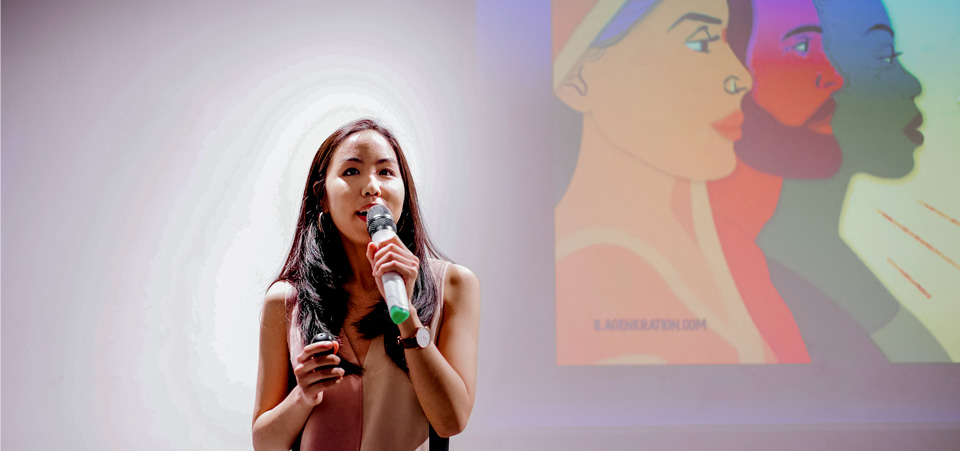Net's Blog
“Men supporting gender equality isn’t enough – they need to be advocates of it too.”
Author: Net Supatravanij

If you ask any man on the street if he supports gender equality, odds are he will say yes. A majority of men worldwide say women’s rights cannot be achieved without male support, according to a recent Ipsos survey. Yet at the same time, 47 per cent of men also say that too much is expected of them in practice in the fight for equal rights and the empowerment of women.
The idealistic vision of the world is always in stark contrast to reality. It’s easy to say, “I support this” or “I believe in that” but having the commitment and consistency to follow through with actions is a different story.
This is particularly true when it comes to men and gender equality. Campaigns such as HeForShe are great examples of men being more involved in the conversation. But we need more. And we don’t only need supporters. We need advocates.
By definition, support is more passive, while advocacy implies proactivity. In my work as co-founder of ila, a social enterprise working to financially empower survivors of sexual violence, I’ve come across both men and women in this field. However, my own interactions have almost always been female oriented. The people who contact us through ila’s website saying they would love to be involved are almost all women. The people who show up to our ilaX events (inspired by TedX but focused on gender) are almost always women. Even corporate volunteers are almost always women.
Why is this the case? From countless conversations I’ve had and observations across multiple social settings and countries, I believe it’s because men think gender equality is a women’s issue. A few months back I attended a talk where British actress Emma Watson was in conversation with Dr. Dennis Mukwege, a Nobel laureate whose work focuses on treating wartime sexual violence. One of my favorite quotes from that evening was when he said, “Sexual violence is not a feminist question. It’s a human question.” This has resonated with me deeply and is a core reason why I feel gender inequality and the consequent gender-based violence need to be challenged by strong, active advocates from both sexes.
While signing a petition is a fantastic start, it’s just a start. Being Thai, I’m saddened by the lack of Thai male signatures on HeForShe’s website (less than 3,000 signatures since the initiative launched in 2014). But the business opportunist in me, believes that there’s no better time than now for men to become involved.
In the wake of #MeToo the topic of gender equality is already topical. But the campaign has also had the unintended negative spill over effects of marginalizing men. Around 60 per cent of male managers said they “were uncomfortable mentoring, socializing with or even working alone with women in the workplace,” according to a recent survey by women’s mutual support platform LeanIn. Although men shying away from women altogether is better than erring too far the other way, it’s certainly not getting them proactively involved in the solution.
So, what can be done?
There are many ways for men to engage with advocating for gender equality. You can start small by attending gender talks. You can instigate social change inside your company by participating in diversity and inclusion initiatives. Or you can think big and start your own movement or join a leadership role of an organization.
Or, my personal favorite, you can begin with yourself and the friends around you. Research shows that there is a correlation between friendships and intentions and behaviour. Social psychologist Amber Gaffney refers to this as ”vicarious dissonance, […] when you see someone behave in a way inconsistent with your attitudes, so you change your attitudes.”
In short, it’s the positive side of peer pressure. So, the next time you are with your group of friends and someone makes a sexist remark, say something. The next time your colleague treats his female counterpart unfairly, call him out on it. And the next time you go to an event that would normally attract a mostly female audience, bring that guy along.

Thai-born Net, 25, founded a corporate social responsibility initiative for her company after realizing there was a soft spot where passion and profession can meet. This led her to pursue a MSc in Social Innovation & Entrepreneurship at The London School of Economics where she co-founded ila, a social enterprise that promotes gender equality by working with sexual violence survivors through an innovative skills-training programme to become financially independent. Learn more about ila here: www.ilageneration.com
Social media accounts:
Personal: https://www.instagram.com/net_kavita
ila Instagram: https://www.instagram.com/ilageneration
ila Facebook: https://www.facebook.com/ilageneration